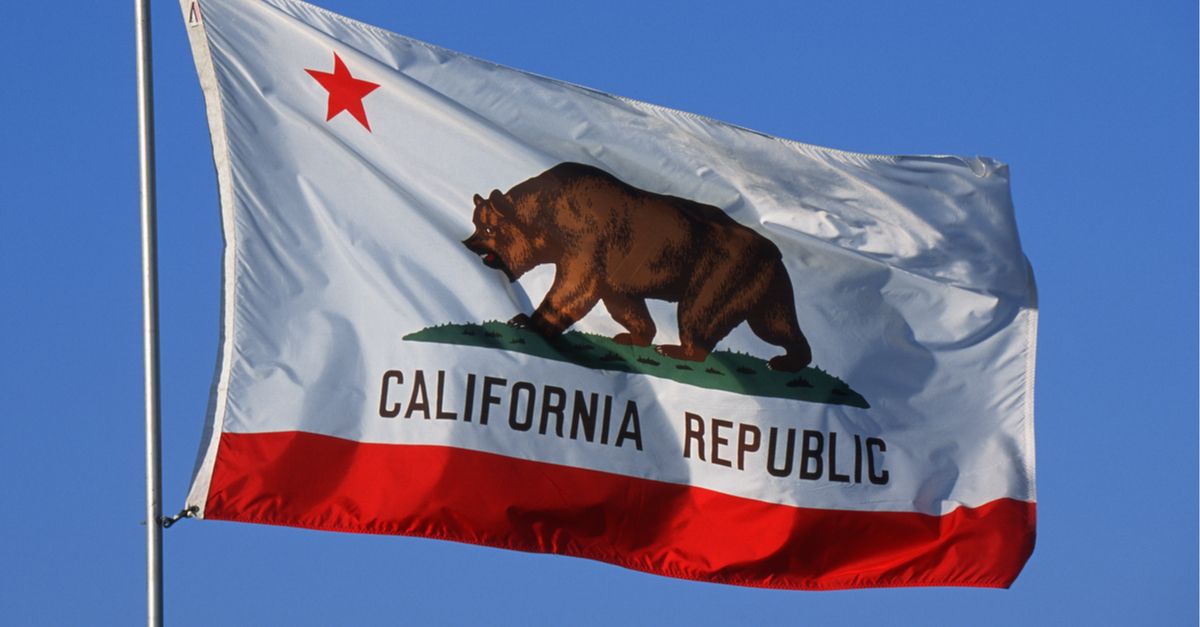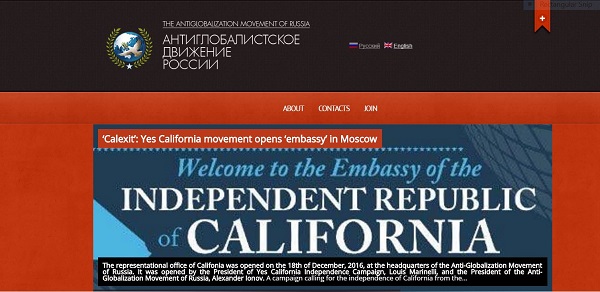When President Donald Trump claimed electoral victory on 8 November 2016 to become the 45th American head of state, it prompted a backlash in historically liberal-leaning California and lent momentum to an effort known as #Calexit to break the nation's most populous state off from the rest of the country. If the secession movement garners the necessary support, a related initiative will be presented to voters for approval on state ballots in 2018.
On 27 January 2017, the right-wing web site Breitbart posted a story questioning the motivation for that effort, based on media reports that the founder of the Yes California campaign has Russian ties:
California Secretary of State Alex Padilla announced that a ballot initiative called “California Nation” has been approved by the state to begin collecting signatures to qualify for the 2018 ballot.
The effort is supported by the “Yes California” campaign, an organization that enjoys the support of the Russian government and whose founder, Louis Marinelli, now lives in Russia.
Marinelli has indeed made no secret of the fact that he not only lives at least part of the time in Russia but also works with a group reportedly backed by the Kremlin, although he denies knowledge of the latter. While he has a San Diego address, as of December 2016 he was interviewed by Bloomberg from his home in the Russian city of Yekaterinburg, where he has a Russian wife and teaches English:
As president of Yes California, Marinelli is organizing a statewide referendum on independence to be held in 2019—if he can collect half a million signatures by next fall. He runs the secession movement from 10,000 kilometers (6,000 miles) away while teaching English at a language school in Yekaterinburg. He is preparing the ground for an “embassy of California” in Moscow, with the help of a vehemently anti-American group supported by the Kremlin. The avatar on his professional Facebook page shows him posing in front of the Voskresenskiye Gates that open onto Red Square.
Marinelli drew a spate of media attention in September 2016 when representatives of secession movements from California and Texas were invited to a convention in Moscow hosted by the Anti-Globalist Movement of Russia (ADR) and financially backed by the Kremlin. There, the Californians and Texans were joined by dissidents from far across the world:
Amidst the heavy glitz of the hotel, Catalonian separatists and dissident Irish republicans listened politely to presentations from east Ukrainian rebels, Azerbaijani minorities and the thoughts of the self-proclaimed "King of Hawaii," who called in via video link.
And among the few dozen activists comparing ideas for how to achieve self-determination, were two Americans campaigning for Texan and Californian secession from the United States.
The conference, now in its second year, is funded largely by the Kremlin and organized by the Anti-Globalization Movement of Russia, a group that closely follows government positions. The movement says it is unconnected to the Kremlin, but the hotel conference was almost entirely paid for by a charitable fund founded by President Vladimir Putin which provided close to $546,000 for the project, according to public records. The attendees, including the Texan delegate, had been offered free flights and accommodation.
Marinelli called us from Russia to say that while he divides his time between Russia and San Diego, the campaign to separate the Golden State from the rest of the United States has no Russian backing. He was, however, unclear on whether the anti-globalist group that hosted the Anti-Globalist convention has backing from the Kremlin. Both the Independent, a British publication, and the Moscow Times, an English-language newspaper based in Moscow, claim that ADR is financially backed by the Kremlin:
Financed by donations from supporters and government grants, ADR has also received grants from the Russian National Charity Fund. An initiative created in 1999 by Vladimir Putin, the Fund has provided ADR with £30,000 since 2014. Its links to the fund, now under the patronage of Russia’s presidential administration, is likely to have influenced the absence of any separatist group operating inside Russia. While vocally supporting pro-Russian separatists in the east of Ukraine, the Kremlin has zero tolerance to separatism within its borders, particularly in Siberia and Chechnya.
Meantime office space for a so-called Yes California "embassy" or cultural center in Moscow is provided by ADR, free of rent. Marinelli said ADR is allowing Yes California to use empty office space pro bono:
Today the Embassy of the Independent Republic of California opens in Moscow. Address: Г. Москва, ул. Клары Цеткин дом 4, Офис 324. #Calexit
— CA Embassy Moscow (@CAEmbRu) December 18, 2016
Marinelli was unclear on who owns the building where the office is located. The building has only been described as a "research facility" by media reports, and Marinelli says he doesn't know if it's privately owned or owned by the Russian government.
Marinelli maintains the only funding that ADR received from the Kremlin he is aware of was a $53,000 grant provided in order to fly separatist activists from all over the world to a 26 September 2016 conference held at the Ritz in Moscow:
As I've been told, [ADR] are not funded by the Russian government except for the grant of $53,000 for a specific earmarked event. We didn’t use it because I was already in Russia. The opportunity I had to take money from Moscow, I didn’t even take it because I was already in Russia. I don’t have access to [ADR's] accounting, so I don’t know the sources of their income.
Marinelli, who was born in Buffalo, New York, told us that the California "embassy" in Moscow is not a diplomatic outpost but functions instead as a cultural center and "a bridge between the people of California and Russia." On 27 February 2017, an event about civil rights and liberties will be held at the Yes California Embassy Moscow.
The Yes California ballot initiative campaign is separate from the California National Party, a political party that has a long-term goal of independence. The California National Party, by contrast, is not pushing for a ballot measure, and representatives say the group has no foreign ties.
While President Trump has been accused of being assisted by the Russian government with hacking that helped him win the election, the Yes California campaign, which theoretically wants to separate the more socially-liberal state from a now-conservative federal government, is also being being linked to the Russian Federation by media reports. The Russian state meanwhile has been criticized by human rights organizations for its record on issues such as free speech and protections for LGBT people.

